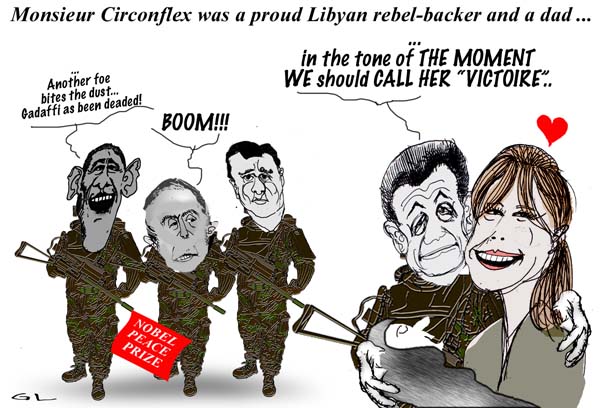Search
Recent comments
- no reason....
41 min 12 sec ago - ask claude...
4 hours 1 min ago - dumb blonde....
11 hours 24 min ago - unhealthy USA....
11 hours 57 min ago - it's time....
12 hours 19 min ago - pissing dick....
12 hours 38 min ago - landings.....
12 hours 49 min ago - sicko....
1 day 1 hour ago - brink...
1 day 1 hour ago - gigafactory.....
1 day 3 hours ago
Democracy Links
Member's Off-site Blogs
"war for peace"?...

- By Gus Leonisky at 21 Oct 2011 - 12:36pm
- Gus Leonisky's blog
- Login or register to post comments
trauma and conflcits ahead...
The conditions making for external intervention in Africa are growing, not diminishing. The continent is today the site of a growing contention between dominant global powers and new challengers. The Chinese role on the continent has grown dramatically. Whether in Sudan and Zimbawe, or in Ethiopia, Kenya and Nigeria, that role is primarily economic, focused on two main activities: building infrastructure and extracting raw materials. For its part, the Indian state is content to support Indian mega-corporations; it has yet to develop a coherent state strategy. But the Indian focus too is mainly economic.
The contrast with Western powers, particularly the US and France, could not be sharper. The cutting edge of Western intervention is military. France's search for opportunities for military intervention, at first in Tunisia, then Cote d'Ivoire, and then Libya, has been above board and the subject of much discussion. Of greater significance is the growth of Africom, the institutional arm of US military intervention on the African continent.
This is the backdrop against which African strongmen and their respective oppositions today make their choices. Unlike in the Cold War, Africa's strongmen are weary of choosing sides in the new contention for Africa. Exemplified by President Museveni of Uganda, they seek to gain from multiple partnerships, welcoming the Chinese and the Indians on the economic plane, while at the same time seeking a strategic military presence with the US as it wages its War on Terror on the African continent.
In contrast, African oppositions tend to look mainly to the West for support, both financial and military. It is no secret that in just about every African country, the opposition is drooling at the prospect of Western intervention in the aftermath of the fall of Gaddafi.
Those with a historical bent may want to think of a time over a century ago, in the decade that followed the Berlin conference, when outside powers sliced up the continent. Our predicament today may give us a more realistic appreciation of the real choices faced and made by the generations that went before us. Could it have been that those who then welcomed external intervention did so because they saw it as the only way of getting rid of domestic oppression?
In the past decade, Western powers have created a political and legal infrastructure for intervention in otherwise independent countries. Key to that infrastructure are two institutions, the United Nations Security Council and the International Criminal Court. Both work politically, that is, selectively. To that extent, neither works in the interest of creating a rule of law.
The Security Council identifies states guilty of committing "crimes against humanity" and sanctions intervention as part of a "responsibility to protect" civilians. Third parties, other states armed to the teeth, are then free to carry out the intervention without accountability to anyone, including the Security Council. The ICC, in toe with the Security Council, targets the leaders of the state in question for criminal investigation and prosecution.
Africans have been complicit in this, even if unintentionally. Sometimes, it is as if we have been a few steps behind in a game of chess. An African Secretary General tabled the proposal that has come to be called R2P, Responsibility to Protect. Without the vote of Nigeria and South Africa, the resolution authorising intervention in Libya would not have passed in the Security Council.
Dark days are ahead. More and more African societies are deeply divided internally. Africans need to reflect on the fall of Gaddafi and, before him, that of Gbagbo in Cote d'Ivoire. Will these events usher in an era of external interventions, each welcomed internally as a mechanism to ensure a change of political leadership in one country after another?
http://english.aljazeera.net/indepth/opinion/2011/08/201182812377546414.html
the new victorious butchers...
Bloodied, wearing just a pair of khaki trousers, and dumped on a cheap mattress, Muammar Gaddafi's body has become a gruesome tourist attraction and a macabre symbol of the new Libya's problems.
Hundreds of ordinary Libyans queued up outside a refrigerated meat store in Misrata, where the dead dictator was being stored as a trophy. A guard allowed small groups into the room to celebrate next to Gaddafi's body. They posed for photos, flashing victory signs, and burst into jubilant cries of "God is great."
Wounds on Gaddafi's body appeared to confirm that he was indeed killed in cold blood in the chaotic minutes following his capture on Thursday. He was found in the town of Sirte, hiding in a drainage pipe. There was a close-range bullet wound on the left side of his head. Blood stains showed another bullet wound to his thorax. His body, subsequently driven to Misrata and publicly paraded, was barefoot and stripped to the waist.
http://www.guardian.co.uk/world/2011/oct/21/muammar-gaddafi-body-misrata-meat-store